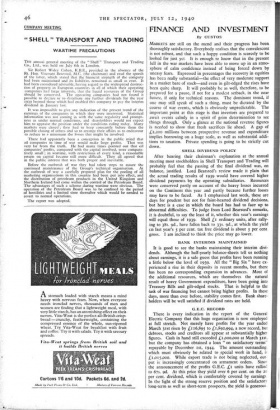COMPANY MEETING
" SHELL " TRANSPORT AND TRADING
WARTIME PRECAUTIONS
THE annual general meeting of the " Shell " Transport and Trading Co., Ltd., was held on July 8th in London.
Sir Robert Waley Cohen, K.B.E., presided in the absence of the Rt. Hon. Viscount Bearsted, M.C. (the chairman) and read the speech of the latter, which stated that the financial strength of the company had been maintained and its liabilities remained as small as ever. It had been considered advisable, having regard to the widespread destruc- tion of property in European countries in all of which their operating companies had large interests, that the liquid resources of the Group should be conserved. The operating companies had not found it possible to declare or to distribute any further dividends for the year 1939 beyond those which had enabled this company to pay the interim dividend in January last.
It was impossible to give any indication of the present trend of the earnings of the companies in which they were interested. Statistical information was not coming in with the same regularity and prompt- ness as under normal conditions, and shareholders would not expect him to appraise the position under the conditions ruling today. Many markets were closed ; they had to keep constantly before them the possible closing of others and so to arrange their affairs as to endeavour to reduce to a minimum the losses that might be involved.
There had apparently been a conception in the public mind that oil companies in time of war would make large profits. That was very far from the truth. He had many times pointed out that oil companies' profits, compared with the capital involved, were compara- tively small ; in wartime, with restrictions of every kind, a reasonable return on capital became still more difficult. They all agreed that in the public interest that was both proper and inevitable.
Before the outbreak of war they had taken steps to assure the continued maintenance of the Group's technical organisation. At the outbreak of war a carefully prepared plan for the pooling of all marketing organisations in this country had been put into effect, and the distribution of petroleum products in the United Kingdom and Northern Ireland had come within the control of the Petroleum Board. The advantages of such a scheme during wartime were obvious. The operation of the Petroleum Board was to be confined to the period of hostilities and a limited time thereafter which would be needed to revert to normal operations.
The report was adopted.


























 Previous page
Previous page